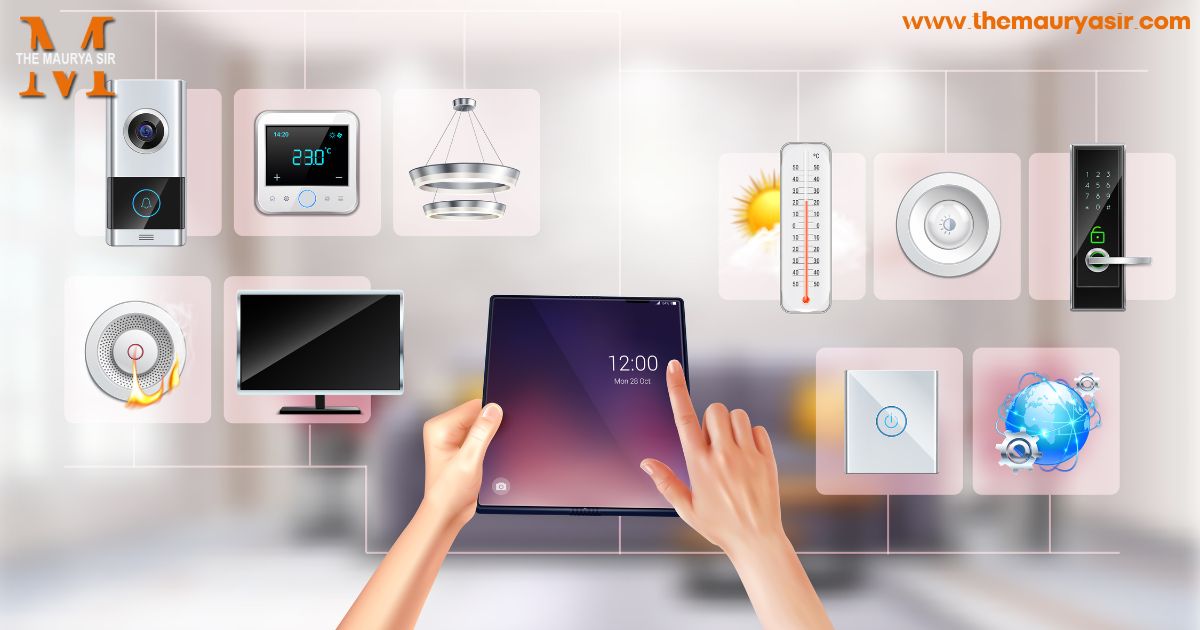Imagine a home that changes to fit your needs. It controls lighting, temperature, and security with just a tap on your phone. This dream is now a reality in India, thanks to smart home automation. Smart home solutions are gaining popularity in India. They offer convenience, security, and save energy. This technology is transforming the way we live, making our homes more comfortable and secure.
As smart living grows, it’s key to know the costs and options for smart home automation in India. This article will give you an overview of smart home automation. It will cover its benefits and the different solutions available.

Understanding Smart Home Automation in India
India’s smart home market is growing fast. This is thanks to new tech and what people want. It’s not just about new gadgets. It’s about making homes better, easier, and safer.
The Evolution of Home Automation Technology in India
Home automation in India has changed a lot. It started with simple devices, and now we have complex IoT systems. Technological advancements have made it possible to connect many smart devices together.
Current Market Trends and Adoption Rates
More people want smart homes now. This is because they know more about it, and it’s getting cheaper. Especially in cities, people are looking for smart solutions to improve their homes.
How Smart Home Systems Work
Smart home systems use many devices and tech. They have two main parts:
Control Hubs and Central Management
Control hubs are the brain of these systems. They let users control all devices from one place. This makes it easy to manage and watch over smart home products.
Device Communication Protocols
Protocols like Zigbee and Z-Wave help devices talk to each other and the control hub. They are key for IoT systems to work well.
These technologies are changing home automation in India. They make it easier and more user-friendly for everyone.
Related Article: How To Invest in Mutual Funds For Beginners in India 2026
Benefits of Smart Home Automation for Indian Households
Smart home automation is changing how Indian families live. It brings many benefits that make daily life better. Homeowners see a big improvement in their quality of life with smart devices.
Enhanced Convenience and Comfort
Smart home automation makes life easier and more comfortable. It includes automated lighting, temperature control, and entertainment. Smart home devices can be controlled remotely, so users can adjust settings even when away.
Energy Efficiency and Cost Savings
Smart home automation is great for saving energy and money. Smart devices help us use less energy, which means lower utility bills.
Electricity Bill Reduction Potential
Smart lights and appliances can turn off when not needed. This cuts down on electricity waste.
Water Conservation Features
Smart water systems can find leaks and use water wisely. This helps save water.
| Benefit | Description | Smart water management systems detect leaks and optimizing usage |
| Energy Efficiency | Optimized energy consumption through smart devices | Up to 20% on electricity bills |
| Water Conservation | Smart water management systems detect leaks and optimize usage | Up to 15% on water bills |
| Improved Security | Smart security systems with real-time monitoring and alerts | Reduced risk of theft and property damage |
Improved Security and Safety Features
Smart home automation also boosts security and safety. Homeowners can watch their property live and get alerts for any odd activity.
Remote Monitoring and Control
Being able to control and check on smart devices from afar gives homeowners peace of mind. They can handle any situation at home, even when they’re not there.
Essential Smart Home Devices Available in India
Smart home technology is becoming more popular in India. Now, people can find many smart devices to make their homes more automated.
Smart Lighting Solutions
Smart lighting systems make homes more convenient and energy-efficient. They also let you control the mood of your space. Brands like Philips Hue and LIFX offer smart bulbs that you can control with your phone or voice assistants.
Popular Brands and Price Ranges
In India, top brands for smart lighting include Philips Hue, LIFX, and Osram. Prices start at ₹2,000 for a single smart bulb. You can also find a full smart lighting system for up to ₹20,000.
Smart Security Systems
Smart security systems boost home safety with features like CCTV cameras and motion sensors. They send alerts and video feeds to your phone.
CCTV and Doorbell Cameras
Godrej and Godrej offer high-quality CCTV cameras with night vision and motion detection. Doorbell cameras from Ring and Google add extra security.
Motion Sensors and Alarms
Motion sensors from Bosch and Siemens detect movement and can trigger alarms or lights. They are key to better home security.
Climate Control Devices
Smart thermostats from Nest and Ecobee let you control your home’s temperature from anywhere. They help save energy and keep your home comfortable.
Entertainment and Audio Systems
Smart speakers like Amazon Echo and Google Home let you control your entertainment with your voice. It’s easy to play music, watch movies, and more.
Smart Kitchen Appliances
Smart kitchen appliances from LG and Samsung have cool features like remote cooking and scheduling. They also send automated notifications.
| Device Category | Popular Brands | Key Features | Remote cooking, scheduling, and automated notifications |
| Smart Lighting | Philips Hue, LIFX | Color control, scheduling, energy efficiency | ₹2,000 – ₹20,000 |
| Smart Security | Godrej, Ring | CCTV, motion detection, doorbell cameras | ₹5,000 – ₹50,000 |
| Climate Control | Nest, Ecobee | Temperature control, energy optimization | ₹15,000 – ₹30,000 |
| Entertainment Systems | Amazon, Google | Voice control, multi-room audio | ₹5,000 – ₹20,000 |
| Smart Kitchen Appliances | LG, Samsung | Remote cooking, scheduling, automated notifications | ₹30,000 – ₹1,00,000 |
Related Article: Best Credit Cards for Diwali Sale Offers on Amazon, Flipkart & More
Smart Home Automation India: Cost Breakdown
Smart home automation in India has different prices. You can find affordable starter kits or more expensive systems. The cost depends on how much automation you want, the quality of devices, and how hard it is to install.
Entry-Level Automation Costs
For beginners, entry-level automation is a good start. These systems usually have basic devices like smart bulbs and plugs.
Budget-Friendly Starter Kits
Starter kits that won’t break the bank cost between ₹5,000 to ₹10,000. They come with a few smart devices and a hub for basic automation.
Mid-Range Smart Home Solutions
Mid-range systems offer more features and better devices. They cost between ₹50,000 to ₹1,50,000. This depends on the number and type of devices you choose.
Premium Automation Systems
Premium systems give you a full smart home experience. They cost more, from ₹2,00,000 to ₹5,00,000 or more. The price varies based on complexity and brand.
Ongoing Maintenance and Subscription Costs
There are ongoing costs after you buy your system. These include maintenance and subscription fees.
Annual Service Packages
Annual service packages cost between ₹5,000 to ₹20,000. This depends on the provider and the service level you need.
Cloud Storage Fees
Some systems need cloud storage, which adds extra costs. These fees are usually ₹500 to ₹2,000 per year.

Knowing these costs helps homeowners make smart choices about their smart home investments.
Top Smart Home Automation Companies in India
India’s smart home market is growing fast. This is thanks to both global and local companies. People want smart homes for their ease, safety, and to save energy.
International Brands Available in the Indian Market
Many global brands have entered India’s smart home scene. These include:
Philips Hue, Amazon Echo, and Google Nest
These brands are famous for their cutting-edge products. Philips Hue makes smart lights. Amazon Echo and Google Nest offer voice control and central hubs for home automation.
Leading Indian Smart Home Solution Providers
Indian companies are also playing a big role in the market. Some top names are:
Oakter, Silvan, and Atom
These companies offer smart home solutions made for India. Oakter focuses on smart building automation. Silvan and Atom bring new home automation products.
Comparison of Service Quality and Support
Choosing a smart home company means looking at service and support. Here’s a comparison of some key points:
| Company | Service Quality | Customer Support |
| Philips Hue | Excellent | 24/7 Support |
| Amazon Echo | High | Email & Phone Support |
| Oakter | Good | Email Support |
DIY vs Professional Smart Home Installation
Homeowners in India face a big choice when setting up smart home automation. They must decide between doing it themselves or hiring a professional. This choice affects the cost, how well the system works, and its reliability.
Self-Installation Options and Considerations
DIY installation can save money. Many smart home devices are easy to use, letting homeowners set up simple systems by themselves. But it needs a good grasp of the technology and its limits.
Before choosing DIY, homeowners should think about how complex their smart home will be. They also need to consider their own tech skills.
Benefits of Professional Installation Services
Professional installation has many advantages. Experts bring knowledge, set up systems efficiently, and make sure they’re ready for the future. They ensure everything works well together and meets the manufacturer’s standards.
Many makers require a pro to install their systems to keep warranties valid. This makes professional installation safer for more complex setups.
Cost Comparison Between DIY and Professional Setup
The cost of DIY versus professional installation is different. DIY might seem cheaper at first because it saves on labor. But professional installation offers long-term benefits like better performance and fewer problems later on.
Labor Charges in Different Indian Cities
| City | Average Labor Charge (per hour) |
| Delhi | ₹800 – ₹1,200 |
| Mumbai | ₹1,000 – ₹1,500 |
| Bangalore | ₹900 – ₹1,400 |
The choice between DIY and professional installation depends on several things. It’s about the homeowner’s tech knowledge, the system’s complexity, and their budget. By thinking about these, homeowners can make a choice that best fits their needs.
LoT Home Automation: Connectivity Options in India
Smart home technology in India is getting better thanks to IoT. The right connection is key for smart devices to work well together.
Wi-Fi-Based Smart Home Systems
Wi-Fi is a top pick for smart homes because it’s easy to use and is everywhere. Things like smart speakers and security cameras use it to connect online.
Zigbee and Z-Wave Technologies
Zigbee and Z-Wave are special wireless technologies for home use. They save power and are reliable, perfect for devices that need to last a long time.
Bluetooth-Enabled Devices
Bluetooth is great for short-range connections. It’s perfect for devices that don’t need to be online all the time.
Internet Requirements and Reliability Factors
A steady internet connection is a must for most smart devices. How fast and reliable your internet is can really affect your smart home’s performance.
Dealing with Internet Outages
To handle internet outages, consider a backup internet or a local hub. These can keep your smart home running even without the internet.
| Connectivity Technology | Advantages | Disadvantages |
| Wi-Fi | Wide availability, easy to set up | High power consumption, security risks |
| Zigbee/Z-Wave | Low power consumption, reliable | Limited range, requires a hub |
| Bluetooth | Low power consumption, easy to use | Limited range, device compatibility issues |
Smart Home Implementation for Different Indian Homes
Smart home solutions are getting popular in many Indian homes, from apartments to houses. Setting up these systems needs careful thought about each home’s unique needs and challenges.
Apartments and Flats
In apartments and flats, space and existing setup can be hurdles for smart home setups. Compact smart devices that don’t need much wiring are often chosen. For example, wireless smart lights and easy-to-use security devices work well.
Independent Houses and Villas
Independent houses and villas have more room for smart home setups. Homeowners can pick full smart home systems, like climate control, security surveillance, and smart lights. The bigger space allows for more devices to be added.
Retrofitting Older Properties
Adding smart tech to older homes is tricky because of their design. But new wireless and battery-powered gadgets make it easier to update without big changes. It’s important to pick devices that are simple to install and don’t need a lot of wiring.
New Construction Smart Home Pre-Wiring
For new homes, it’s best to wire for smart systems before building starts. This makes installing smart tech easier and gives a better smart home experience. Builders and developers are key in this step.
Working with Builders and Developers
Working with builders and developers is crucial for a smooth, smart home setup in new homes. They can make sure the right setup is in place for smart tech later. Important things to think about include:
- Pre-wiring for smart lighting and security systems
- Incorporating smart home hubs and controllers
- Ensuring compatibility with various smart devices

Challenges and Limitations of Smart Home Automation in India
Smart home automation is growing in India, but it faces challenges like power outages and connectivity issues. It’s important to tackle these problems to make sure users have a smooth experience.
Power Outage Considerations
Power outages in some areas can stop smart home devices from working. Using backup power like UPS or generators can help solve this problem.
Internet Connectivity Issues
Good internet is key to smart home automation. Places with bad internet can have problems with smart home services.
Privacy and Security Concerns
Smart home devices can be at risk of cyber attacks. It’s vital to use strong security like encryption and secure login, to keep user data safe.
Compatibility Between Different Brands and Systems
There’s a problem with different smart home devices not working together well. This is because there’s no standard for all devices.
Creating a Unified Ecosystem
To fix this, we need a single system for all devices. This means picking devices that follow the same standards, like Zigbee or Z-Wave. Or using hubs that can connect many devices.
- Choose devices with common standards
- Use hubs for integration
- Regularly update device firmware
The Future of Smart Homes in India
The smart home market in India is growing fast. This is because more people know about it, and technology is getting better. As homes get smarter, people will want more devices and systems. This will change how we live and interact with our homes.
Smart homes offer many benefits, like being more convenient, saving energy, and being safer. Thanks to IoT technology, smart homes in India will get even better. We’ll be able to control and watch our home devices easily.
As the market grows, we’ll see new and exciting things from top smart home companies in India. The future of smart homes here looks bright. It will impact many areas, like homes, businesses, and industries. With the right tech and setup, smart homes will be a big part of Indian life, changing how we think about home.
FAQ
Smart home automation uses technology to control and monitor your home. This includes things like lighting, temperature, security, and entertainment. It connects devices to a central hub or network. This lets users control them from their smartphones, tablets, or voice assistants.
Smart home automation in India offers many benefits. It makes life easier, saves energy, and boosts security. It also lets you monitor your home from anywhere. Plus, it can lower your electricity bills and increase your home’s value.
In India, IoT home automation uses Wi-Fi, Zigbee, Z-Wave, and Bluetooth. Each has its own advantages and disadvantages. The right choice depends on what you need.
Smart home automation costs vary in India. It depends on the devices, installation complexity, and product quality. Basic systems start at around ₹50,000. But high-end systems can cost over ₹5 lakhs.
Some devices can be installed DIY, but others need a pro. Complex wiring or integration might require a professional. It’s best to get advice from a professional installer.



